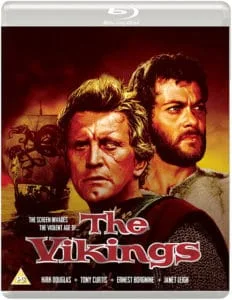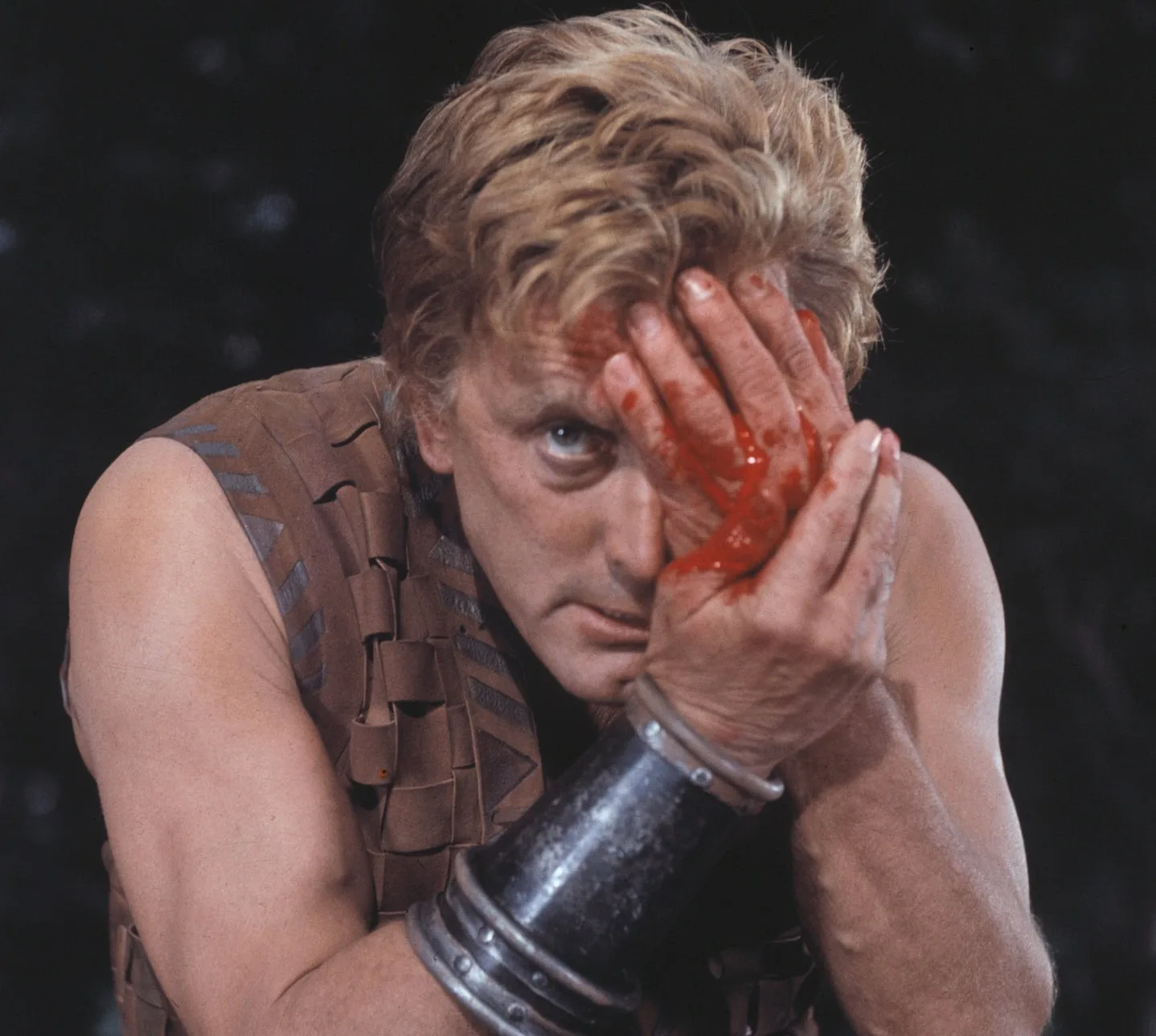In a historical context, The Vikings might be deemed a bit of a curiosity, walking a tightrope between the grandiose historical epic and the B-movie swashbuckler. Given that its leading men Kirk Douglas and Tony Curtis reunited two years later for Spartacus, it’s easy to dismiss The Vikings as little more than a dry run for Stanley Kubrick’s classic gladiator movie. Indeed, hold it up alongside the likes of Spartacus or Ben-Hur, and Richard Fleischer’s 116 minute film feels positively small-scale; and, despite reported efforts to make the film as historically accurate as possible in its depiction of the infamous Norse ravagers, it feels for the most part like a standard adventure yarn with all its seafaring, sword-swinging, bodice-ripping, mead-swigging frolics. This uneven tone by all accounts is rooted in conflicts between Fleischer and Douglas, producer as well as star; the director had favoured Dale Wasserman’s script (adapted from Edison Marshall’s novel The Viking) which took a more mythic, poetic approach to the dialogue, but Douglas – with the backing of his pal Kubrick – dismissed this as unreadable, and had Calder Willingham rewrite it in a more colloquial fashion. Not unreasonably, the director was not happy about being overruled in this fashion, and found the production a very stressful one.

A short-haired and clean-shaven Douglas (what was all that about historical accuracy?) is Einar, son of Viking chieftain Ragnar (Ernest Borgnine – who, fun fact, was actually two months younger than Douglas). This particular Viking horde have been attacking England for decades, and have their sights set on a full-scale invasion; and to this end, Ragnar has found an English ally in Lord Egbert (James Donald), who promises to provide maps of England that will aid their efforts. There is good reason behind Egbert’s treason; he hopes to see the corrupt, unlawful king Aella (Frank Thring) overthrown. Then, in one of those remarkable feats of good fortune one only encounters in the movies and/or on the pages of paperbacks, Egbert discovers that a slave in the Viking encampment named Eric (Curtis) is in fact the son of the now-dead English Queen; and more, he is the bastard son of Ragnar, who raped the queen in a raid more than 20 years earlier. As a result, Eric and Einar are, without knowing it, brothers, yet they despise one another; never more so than when, at the suggestion of Egbert, the Vikings abduct Aella’s betrothed, the lady Morganna (Janet Leigh), with whom both Eric and Einar instantly fall in love.
While no one’s going to mistake it for its almost-namesake contemporary TV series, it’s not hard to see how The Vikings was considered a fairly extreme film for its day. There is a notably bloody moment when Einar loses an eye to a hawk attack (the film landed the year after Hammer’s The Curse of Frankenstein, which shocked everyone with a similar splash of gore); and, while the raid and battle sequences are not necessarily that graphic, it’s abundantly clear what’s going on, not least when it comes to the raping. I’m quite surprised that, in the current climate, the BBFC remain happy to release The Vikings under a PG certificate, given that Borgnine’s Ragnar is introduced gleefully assaulting the clearly horrified Queen, and that Einar’s later attempted rape of Morganna is played as a love scene. There’s another, perhaps even more distressing moment in which a drunken Ragnar regales his equally inebriated son with loving memories of forcing himself upon the younger Viking’s mother; moments that were perhaps easier to take in jest at the time but, as we’re all very much aware, prevailing attitudes have quite rightly changed.

Of course, nobody goes to see a movie called The Vikings in search of provocative political overtones. Large-scale action and spectacle are the order of the day, and it’s on this count that the film really delivers. Richard Fleischer directed his share of adventure movies (and I don’t care what anyone says, Conan the Destroyer and Red Sonja are great), but this is surely the best he ever made. The sets and ships are gorgeous against the Norwegian locations, all beautifully captured by Jack Cardiff’s Technicolor cinematography; whilst the battle scenes, especially the final attack on Aella’s castle, really are eye-opening, adrenaline-pumping moments to this day, particularly when we take into account just how much of it had to be achieved in-camera. And while it may be fair to give Douglas a hard time for showboating, there can also be no denying that he is every inch the big screen man of action; his scar-faced look is iconic, and he seems totally in his element be he lashing with his sword, galloping on horseback, fighting hand to hand, scaling a castle wall, or running across the oars of a longboat, much of it for real. And – spoiler warning – damned if he doesn’t make dying with your sword in your hand, crying “Odin” as your last word, then getting a Viking funeral look like the coolest possible way to leave this life behind.
This a really nice edition of the film that fans won’t want to miss, presenting the film in 1080p with original stereo PCM soundtrack. As well as the aforementioned accompanying booklet and featurette (‘A Tale of Norway’), there’s also a video interview on the film with historian Sheldon Hall, plus of course the theatrical trailer and optional subtitles.
The Vikings is available now on Blu-ray from Eureka Entertainment; order here.
